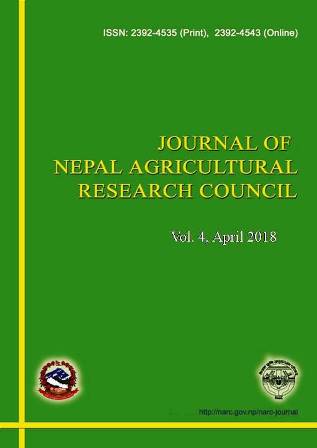Soil Fertility Assessment and Mapping of Regional Agricultural Research Station, Parwanipur, Bara, Nepal
DOI:
https://doi.org/10.3126/jnarc.v4i1.19688Keywords:
Nutrient index, Research strategy, Soil fertility mapping, Soil properties, Soil testingAbstract
Soil fertility assessment is a key for sustainable planning of a particular area. Thus, the present study was conducted to assess the soil fertility status of the Regional Agricultural Research Station, Parwanipur, Bara, Nepal. The study area is situated at the latitude 27°4’40.9’’N and longitude 84°56’9.85”E at 75masl altitude. Altogether 76 soil samples were collected based on the variability of land at 0-20 cm depth. The texture, pH, OM, total N, available P2O5, K2O, Ca, Mg, S, B, Fe, Zn, Cu and Mn content in the samples were determined following standard analytical methods. Arc-GIS 10.1 was used for soil fertility mapping. The soil structure was angular blocky, and varied between grayish brown (10YR 5/2) and dark grayish brown (10YR 4/2) in color. The sand, silt and clay content were 24.41±0.59%, 54.57±0.44% and 21.03±0.32%, respectively and categorized as silt loam and loam in texture. The soil was moderately acidic in pH (5.67±0.09), low in organic matter (0.74±0.04%) and available Sulphur (0.8± 0.1 ppm). The total nitrogen (0.06±0.001%), available boron (0.59±0.08ppm) and available zinc (0.51±0.05ppm) were low. Furthermore, available potassium (50.26±2.95ppm), available calcium (1674.6±46.3ppm) and available magnesium (175.43± 8.93ppm) were medium. Moreover, available copper (1.36±0.06 ppm) and available manganese (16.52±1.12 ppm) were high, while, available phosphorus (77.55±6.65 ppm) and available iron (85.88±7.05 ppm) were found high. It is expected that the present study would help to guide practices required for sustainable soil fertility management and developing future agricultural research strategy in the farm.
Downloads
Downloads
Published
How to Cite
Issue
Section
License
This license enables reusers to distribute, remix, adapt, and build upon the material in any medium or format for noncommercial purposes only, and only so long as attribution is given to the creator.




